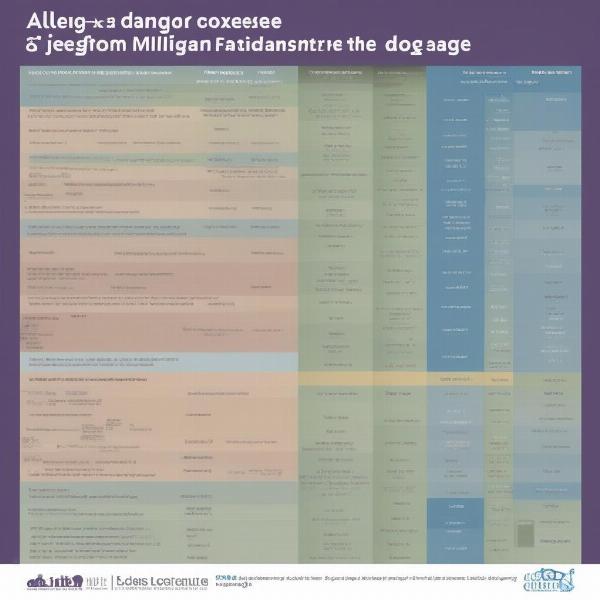Allergerex is a common medication prescribed for dogs experiencing allergic reactions. Understanding the proper Allergerex for dogs dosage is crucial for effectively managing your dog’s allergies and ensuring their safety. This guide will explore various aspects of Allergerex, including dosage guidelines, potential side effects, and alternative allergy management strategies.
Understanding Allergerex and its Uses
Allergerex, also known by its generic name diphenhydramine, is an antihistamine used to relieve allergy symptoms in dogs. These symptoms can range from mild itching and skin redness to more severe reactions like hives, swelling, and difficulty breathing. Allergerex works by blocking the effects of histamine, a chemical released by the body during an allergic reaction. While it can provide effective relief, determining the correct Allergerex for dogs dosage is vital to avoid potential side effects.
Allergerex for Dogs Dosage Guidelines
The typical Allergerex for dogs dosage is 1-2 mg per pound of body weight, given two to three times a day. However, it is crucial to consult with your veterinarian before administering Allergerex to your dog. They can assess your dog’s specific needs, consider any underlying health conditions, and determine the most appropriate dosage. Never exceed the recommended dosage without veterinary guidance.
 Allergerex Dosage Chart for Dogs
Allergerex Dosage Chart for Dogs
Potential Side Effects of Allergerex in Dogs
While generally safe, Allergerex can cause some side effects in dogs. These can include drowsiness, dry mouth, increased heart rate, and urinary retention. If you notice any unusual behavior or symptoms in your dog after administering Allergerex, contact your veterinarian immediately.
Alternative Allergy Management Strategies for Dogs
Beyond Allergerex, several other strategies can help manage your dog’s allergies. These include identifying and avoiding allergens, using specialized shampoos and topical treatments, and considering immunotherapy. Your veterinarian can guide you in determining the best approach for your dog’s specific allergy triggers and severity.
Identifying and Avoiding Allergens
Identifying the specific allergens triggering your dog’s reactions can significantly improve their comfort and reduce the need for medication. Common allergens for dogs include pollen, dust mites, mold spores, and certain foods. Allergy testing can help pinpoint the culprits, enabling you to minimize exposure.
Specialized Shampoos and Topical Treatments
Medicated shampoos and topical treatments can provide relief from itching and inflammation associated with allergies. These products often contain ingredients like oatmeal, aloe vera, or hydrocortisone, which soothe irritated skin.
Immunotherapy for Dog Allergies
Immunotherapy, also known as allergy shots, involves gradually exposing your dog to increasing amounts of the allergen. This process helps desensitize their immune system, reducing the severity of their allergic reactions over time.
Conclusion
Managing dog allergies effectively requires a comprehensive approach, with Allergerex playing a potential role in symptom relief. Understanding the correct Allergerex for dogs dosage and consulting with your veterinarian is paramount. By combining appropriate medication with other allergy management strategies, you can help your dog live a comfortable and allergy-free life.
FAQ
-
How often should I give my dog Allergerex? Typically, Allergerex is given two to three times a day, as directed by your veterinarian.
-
Can I give my dog Benadryl instead of Allergerex? Benadryl is the brand name for diphenhydramine, the same active ingredient in Allergerex. However, always consult your vet before giving your dog any medication, even over-the-counter ones.
-
What are the signs of an allergic reaction in dogs? Common signs include itching, redness, hives, swelling, sneezing, and difficulty breathing.
-
What should I do if my dog has a severe allergic reaction? Seek immediate veterinary attention.
-
Are there any natural alternatives to Allergerex for dogs? Several natural remedies, such as oatmeal baths and certain supplements, may help alleviate allergy symptoms. Discuss these options with your vet.
-
Can allergies be cured in dogs? While allergies cannot be cured, they can be effectively managed to minimize symptoms and improve your dog’s quality of life.
-
How can I prevent my dog from developing allergies? While there’s no guaranteed way to prevent allergies, minimizing exposure to potential allergens and maintaining a healthy immune system can help reduce the risk.
About ILM Dog:
ILM Dog is your trusted international resource for expert dog care advice, covering breed selection, health, training, nutrition, grooming, and more. We offer practical guidance for dog owners of all experience levels, from puppy care to senior dog support. For personalized advice on your dog’s health, including allergies, connect with our experts. Email us at [email protected] or call us at +44 20-3965-8624.